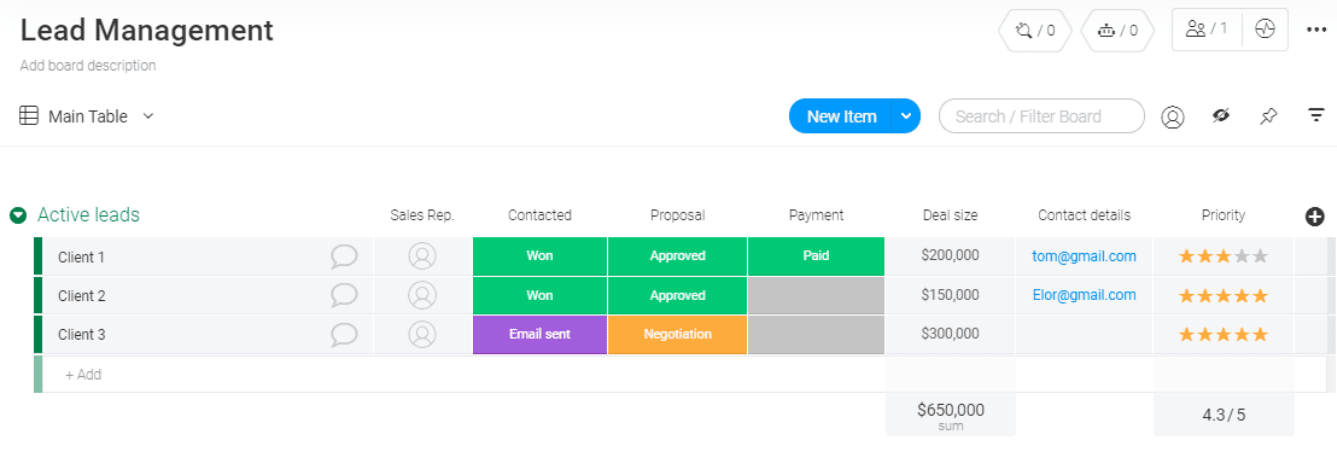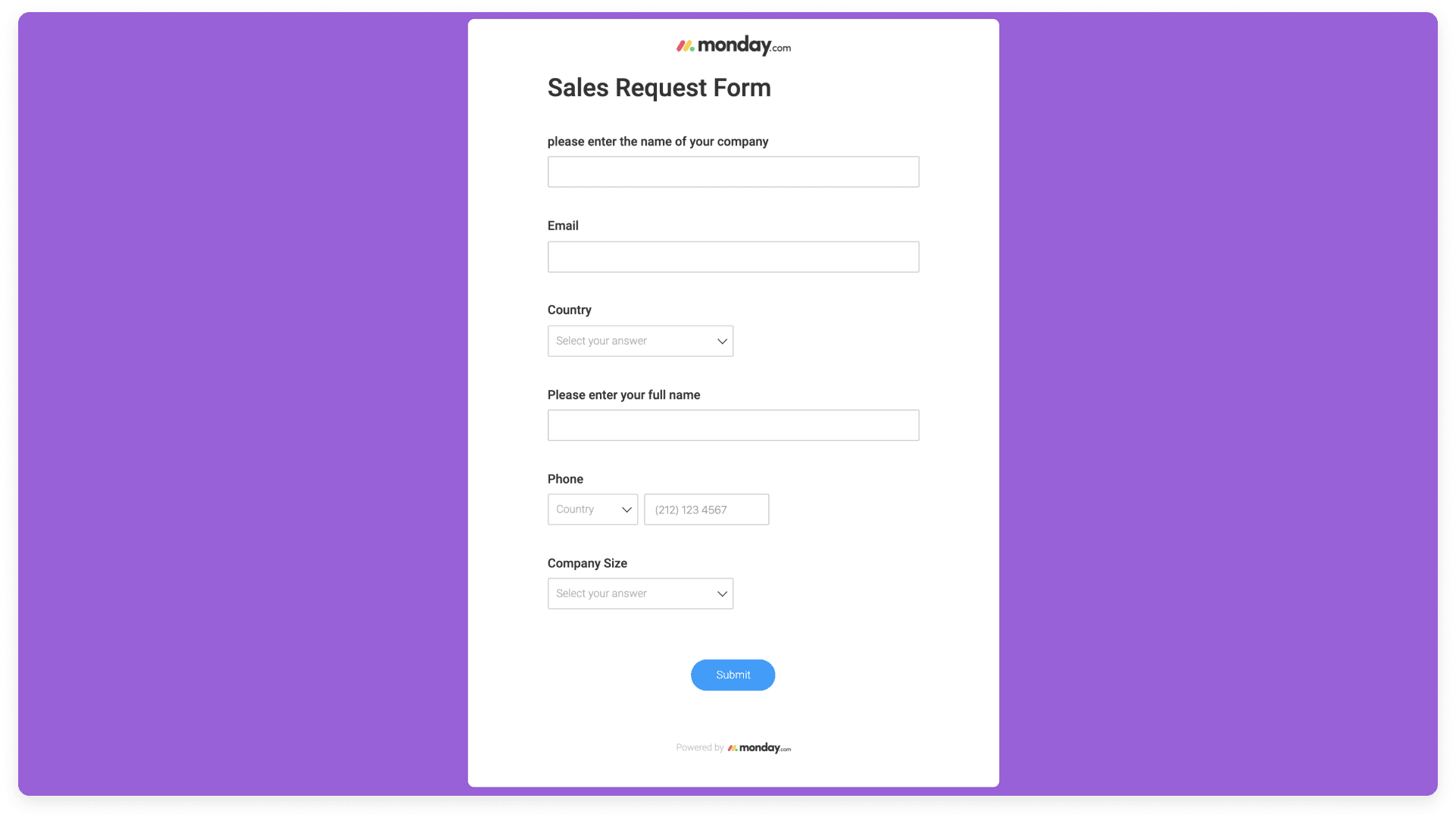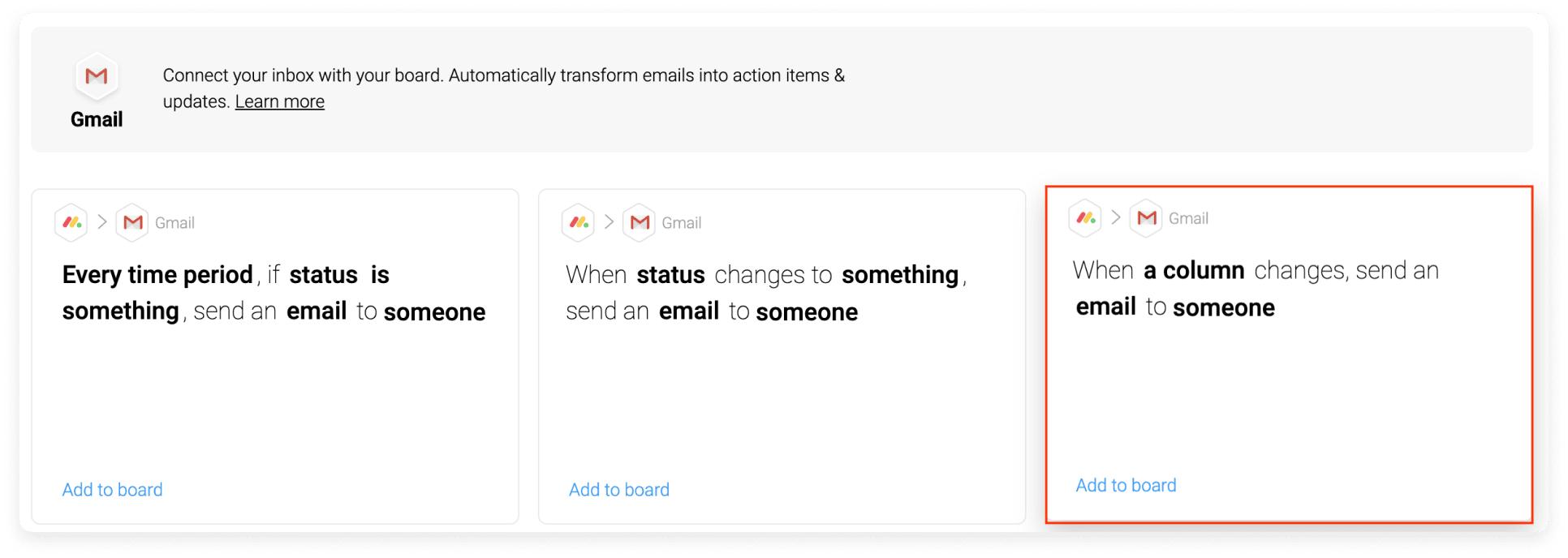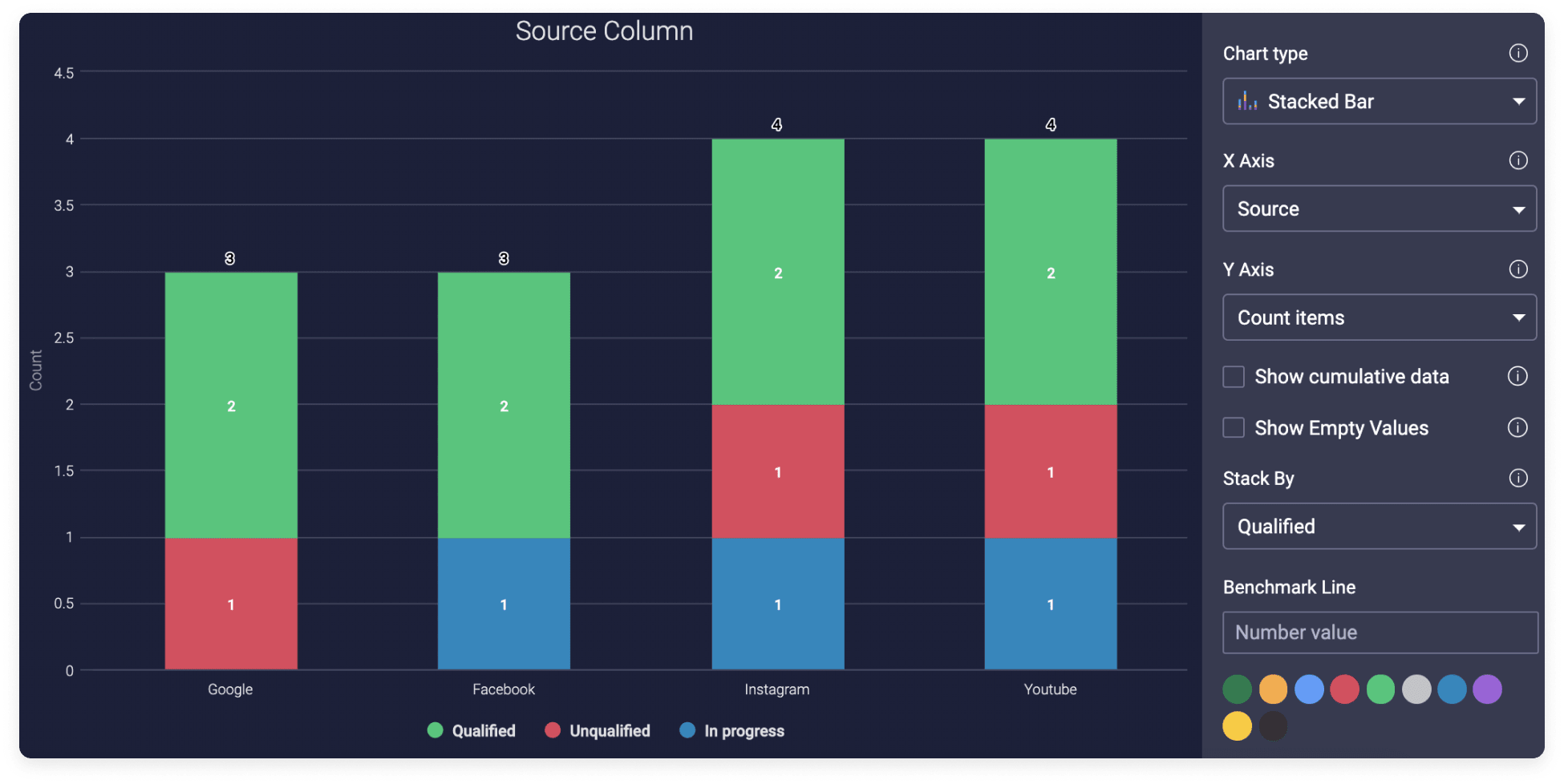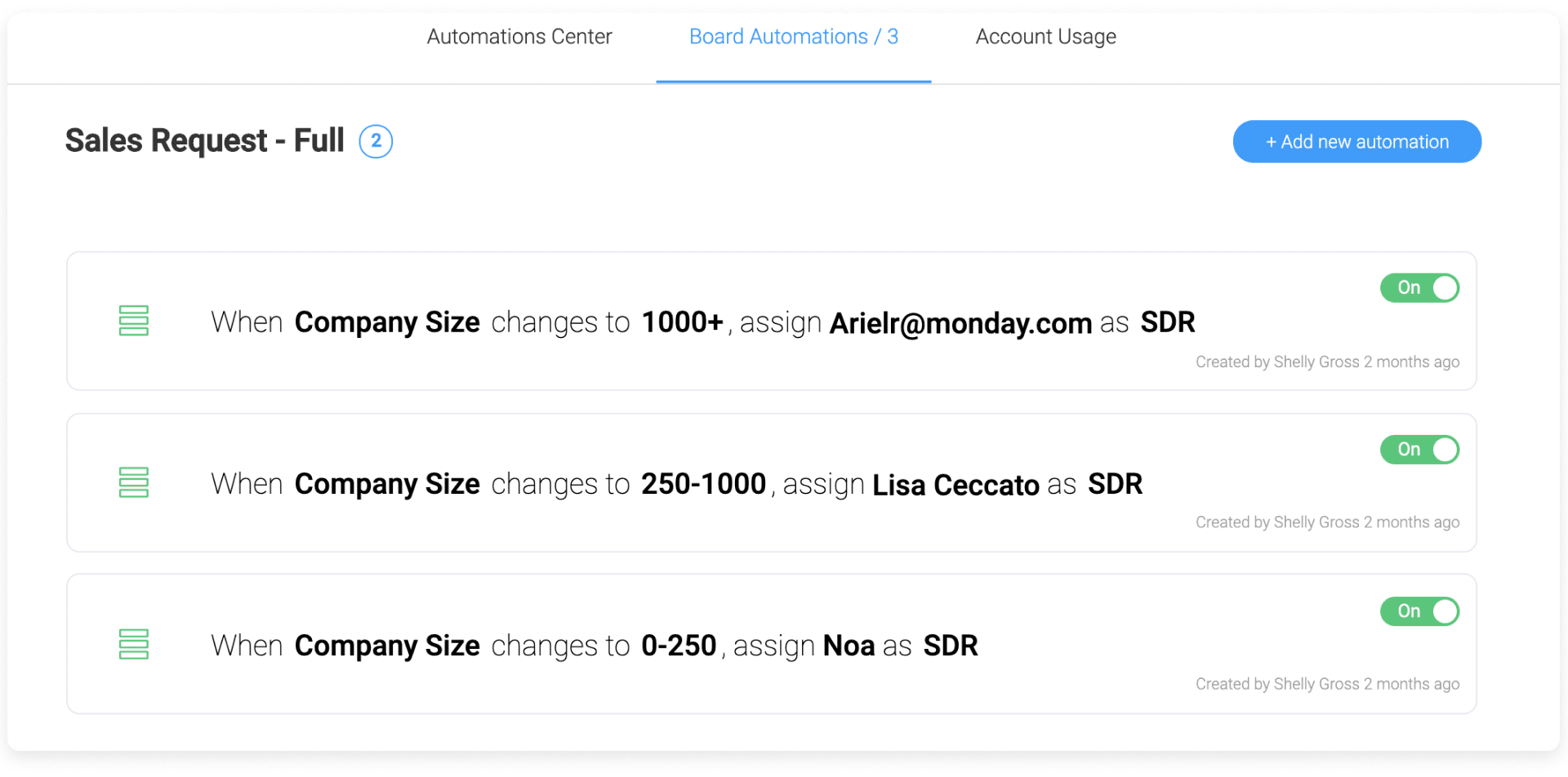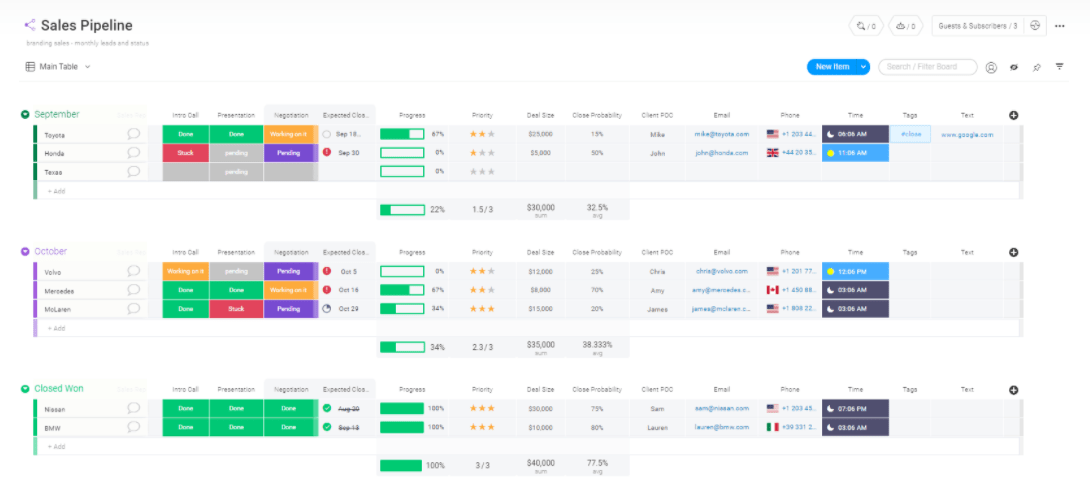The average sales cycle can be 120 days long for a high-value product, while the average sales development rep makes about 9 attempts to convert prospects.
Multiply that by 10 or 100 new leads per day, and you’re looking at tracking 100s of customer conversations over several months.
Sound like a nightmare? It doesn’t have to be if you’re using a lead manager.
A good lead manager helps you streamline your sales process, automate workflows, and track leads in a quick and simple way.
In this piece, we’ll explore what a lead manager is, why it’s important, and 6 simple steps to boost sales with a lead manager. Finally, we’ll see why a solution like monday.com helps you better manage and nurture sales leads.
What’s a sales lead manager and why’s it important?
A lead manager is software that helps you track sales leads from the time you capture their contact details to the point where they become customers.
Sales leads — or people that express an interest in your product — go through various stages before they become customers: capture, filtering, scoring, distribution, contact, follow-up, and nurturing.
The process is as time-consuming and complex as it looks.
A lead manager helps sales reps easily track lead activity at different stages, use their time more efficiently, and build meaningful relationships with customers.
One survey found that companies that use sales technology are 63% more likely to have their sales development reps hitting their sales quotas, as compared to those who don’t.
How to simplify sales lead management with a lead manager: 6 simple steps
Lead manager software offers various features and automations to make sales management less of a hassle.
Here’s how sales teams can refine their sales process with a lead manager:
Capture and store leads
Did you know 33% of your sales leads may simply be vanishing into thin air, never to hear from your team? Or that a whopping 91% of leads may not receive the ideal number of calls from your team?
Here’s how you can avoid this: set up a systematic process to capture and store leads with a lead manager.
You likely receive sales leads from multiple sources: your website, blog, social media, gated content, LinkedIn outreach, events, and webinars.
When you store leads from these diverse sources in one place, your sales reps can easily track and nurture them. No more leads slipping through the cracks.
A lead manager allows you to store information such as a prospect’s name, country, email, and phone number. Ideally, you’ll want a tool that offers the option to capture and automatically collect leads in one place.
For instance, when you set up lead generation forms in monday.com, all of your lead data is automatically captured on a board you choose.
This is what our lead generation forms look like:
You can also use the monday.com Clearbit integration to populate your lead data with useful information such as company size, money raised, location, social media profiles, and number of employees. This helps your sales reps better score and qualify leads.
Track lead activity
For 12% of sales reps, a major prospecting challenge is maintaining consistency in contact frequency — and the messages they send prospects — across multiple channels.
So, what’s a hassled sales rep to do? Luckily, lead tracking is really where a lead manager shines.
With a sales lead manager, you can:
- Add leads to different stages like contacted, follow up, closed-won, and closed-lost
- Assign leads to a specific sales rep
- Make notes on your latest conversation with each lead
This helps your team send relevant, timely follow-ups to prospects at different stages and send out consistent messages.
Here’s what sales lead tracking looks like in monday.com:
Nurture sales leads
You may not think twice before buying a pair of jeans or a new flavor of ice cream, but what about the last big purchase you made: a laptop, refrigerator, or a car? You likely spent hours poring over information about its features and speaking to sales reps.
B2B software selling works the same way. Customers spend considerable time reading about the return on investment of a product and its capabilities. They lean towards businesses that share research and content relevant to their problems.
Ultimately, they buy from sales reps they consider trusted advisers. This process is also known as lead nurturing.
Lead manager software helps you juggle nurturing activity for all leads, so you don’t end up sending the same PDF twice or sending a response to the wrong client.
For instance, in monday.com, you can make a note of all promotional material sent to a specific client or even set up automated lead nurturing workflows using the Gmail integration.
Here’s how it works:
Use data to your advantage
A lead manager arms you with data to improve your sales process.
As per one survey, 51% of companies use sales data to assess their teams’ efficiency, while 48% use it to analyze closed-lost deals to glean lessons for the future.
What’s more, salespeople who pay attention to data are more likely to outperform their peers.
One LinkedIn study found top-performing salespeople are more likely to evaluate patterns on closed-lost and closed-won deals, and select locations to target. Which means more business won and more revenue generated.
A platform such as monday.com can help you quickly mine these insights from your sales data.
You can create custom charts, bar graphs, and reports to reveal trends and patterns — closed-won deals per sales rep, sales quotas, lucrative industries, best locations for your sales team, and more.
Boost transparency
While recognition, contests, and one-on-one coaching may be effective ways to boost your team’s morale, want to know the best way to get them fired up about meeting their sales goals? Give them more visibility of the numbers.
Specifically, your team needs answers to the following questions, according to Scott Barker, head of partnerships at Sales Hacker:
“Sellers want transparency across the entire revenue organization. Where is the team sitting for the month? Why did my quota go up? How long of a runway do we have if we aren’t hitting our numbers?”
A sales lead manager helps you bring much-needed transparency to your sales process.
At a glance, teams can see the accounts assigned to each sales rep, how everyone in the team is performing, and why their sales quotas may go up or down at any given point.
Automate your workflow
The journey from lead capture to conversion consists of many small yet crucial steps to move leads along the way.
Moving a lead from first contact to follow up. Sending Mr. Smith a whitepaper. Following up on that email you sent to the VP of marketing at ACME Corp.
Luckily, with a lead manager, you can automate most of these tasks.
A robust lead manager allows you to automatically:
- Assign leads to sales reps based on company size
- Move qualified leads further down the sales pipeline
- Send relevant marketing materials to leads for nurturing
- Send emails/text messages to your rep once they’re assigned a lead
- Add meetings to your calendar
Take a look at how you can set up automations in monday.com, no coding required:
Fun fact: one of monday.com’s clients, Parvenu, has 150 automations and 52 integrations set up on a single board. They use it to send automated follow-ups and messages to all their sales leads.
Why monday.com is the lead manager software you’re looking for
We’ve seen a fair bit of monday.com’s capabilities as a lead tracking software, but there’s more.
Here are some other ways teams can use monday.com to supercharge their sales process:
- Boost collaboration within your sales team
- Score leads as they move through the sales funnel
- Track customer training and onboarding post sales
Entrepreneur.com increased its digital sales by 23% after adopting monday.com.
Initially, the team struggled to track sales leads by rep, agency, brand, and territory. They needed a customizable CRM solution to fit their needs.
Enter monday.com.
The platform helped streamline their sales process and bring more clarity to the team. Specifically, it helped them:
- Track leads throughout the sales funnel: won, contract sent, negotiating, prospects, and request for proposal
- Collaborate effectively as a remote team
- Add notes on client conversations
- Access information in real-time, so reps responded faster to client requests and send proposals
- Analyze goals and opportunities won
In a nutshell, monday.com allowed the team to build a sales process that adapted to their team’s workflow.
All said and done, we believe the proof of the pudding is in the eating. Why don’t you take monday.com for a spin and see what it can do (for free for 2 weeks)?
Here’s a quick sales pipeline template to get you started:
Boost sales with monday.com as your lead manager
Sales processes are hardly linear. The typical B2B conversion involves multiple buyers, conversations, and emails over several months. A lead manager such as monday.com offers a systematic way for sales reps to keep pace with this frenzy of activity.It allows teams to track leads all the way from capture to nurture to the closed-won stage.
It also helps them automate mundane tasks like sending brochures for inquiries or reminding sales reps to follow up.
If you’re excited to see what monday.com can do for your sales team, we’d love for you to try it. We did mention it’s completely free for the first 2 weeks, right?

